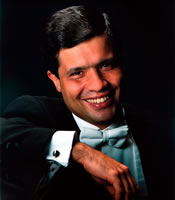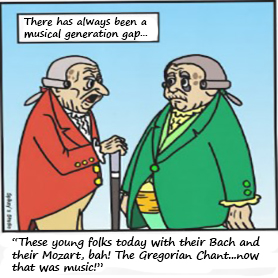|
I've taken the subway in New York a few times, and the only musician I ever heard was a solo sax player playing Prokofiev (or maybe it was Stravinsky--I can't remember for sure). In the video I link to below, not only do you have a quartet playing Bach, but they're joined toward the end by a group of ballet dancers.
Pretty entertaining, I think! You can see it here. In all fairness, while I know a little about the Houston arts scene (including having seen the Houston Grand Opera), I wasn't aware of a group named Opera in the Heights. Evidently they hired a conductor who was making a lot of progress with the group, but I suppose that's not what they wanted. They've fired the conductor, in the name of "changing direction".
Here's what they said specifically (from an article on the Houston Press blog): they're going to do shorter operas, and they're going to focus on local talent (especially beginning artists). The idea of giving beginning artists a place to start is admirable, but the whole thing of doing shorter operas sounds troubling to me. I smell some dumbing down here. But what do I know? Make your own judgments as you read the entire article here. I know this topic may seem a little far afield for a classical music page, but as a classical broadcaster, it carries a great deal of significance for me.
For years, there's been a sort of Chicken Little mentality in radio, even going back decades: cassettes will kill radio (people will record their music off the air, and then never tune in again), satellite "radio" will kill radio, web streaming will kill radio. A lot of people in the industry have been running scared, thinking we could be out of business any day now. Even the former head of NPR stated a few years ago that within a decade, all of our towers would go away. I'm not saying technology doesn't pose challenges for radio, but we still have a lot of strengths. Seth Stevenson at Slate does a pretty good job of outlining them in an article you can read here. The Philadelphia Singers, a professional chorus, was founded in 1972. They established a solid reputation, but recently have fallen on hard times--they've amassed some debt, their Executive Director is leaving, and their major funder has declined to renew their grant for the upcoming season.
As a result, they will cease operations after their final concert of this season in May. A more complete rundown of the story can be found here. It wasn't long ago that many politicians were calling for a zeroing-out of money for CPB, the Corporation for Public Broadcasting, which in turn provides the Federal monies to public media outlets. Such a move would be disastrous for stations airing classical music.
In the current budget deal reached over the weekend, CPB will receive its full appropriation. There's more on the story in Current, a publication for public media professionals. The article can be seen here. Louisville (KY) Public Media's classical station, WUOL, is seeking someone to both serve as a classical announcer, and to coordinate their youth programs. They currently have three programs underway.
Requirements include not only experience in on-air work with a strong knowledge of/interest in classical music, but also some education experience as well. The complete posting can be found here. While it's impossible to know exactly what led to this week's tragic event, Dallas Morning News music critic Scott Cantrell talked to people who knew Jose Feghali, and there are indications that he had struggled with depression for some time. KERA has also reported that the former director of the Cliburn competition stated that he knew Feghali struggled with depression.
One might expect that winning a prestigious competition like the Cliburn would make a pianist's career for life, but as Cantrell points out, that simply isn't always the case. Feghali's performing career had been in decline for a number of years--though his teaching career should have been a bright spot. And reportedly, he was quite knowledgeable in tech, as he was also Coordinator of internet Technologies for the School of Music at TCU. Whatever the circumstances were, his death is all too tragic. Cantrell's article is available here. Public radio station KERA has more on Jose Feghali, his life and passing here.
 Famed pianist and 1985 Gold medal winner in the Van Cliburn competition is dead as the result of a gunshot wound to the head, according to a report in the Dallas Morning News. Since 1990, the Brazilian-born pianist had been Artist-in-Residence at Texas Christian University's School of Music. He was 53. The complete story can be found here. |
AuthorI'm a classical radio announcer, blogger, and musician. Archives
April 2022
Categories |

 RSS Feed
RSS Feed
